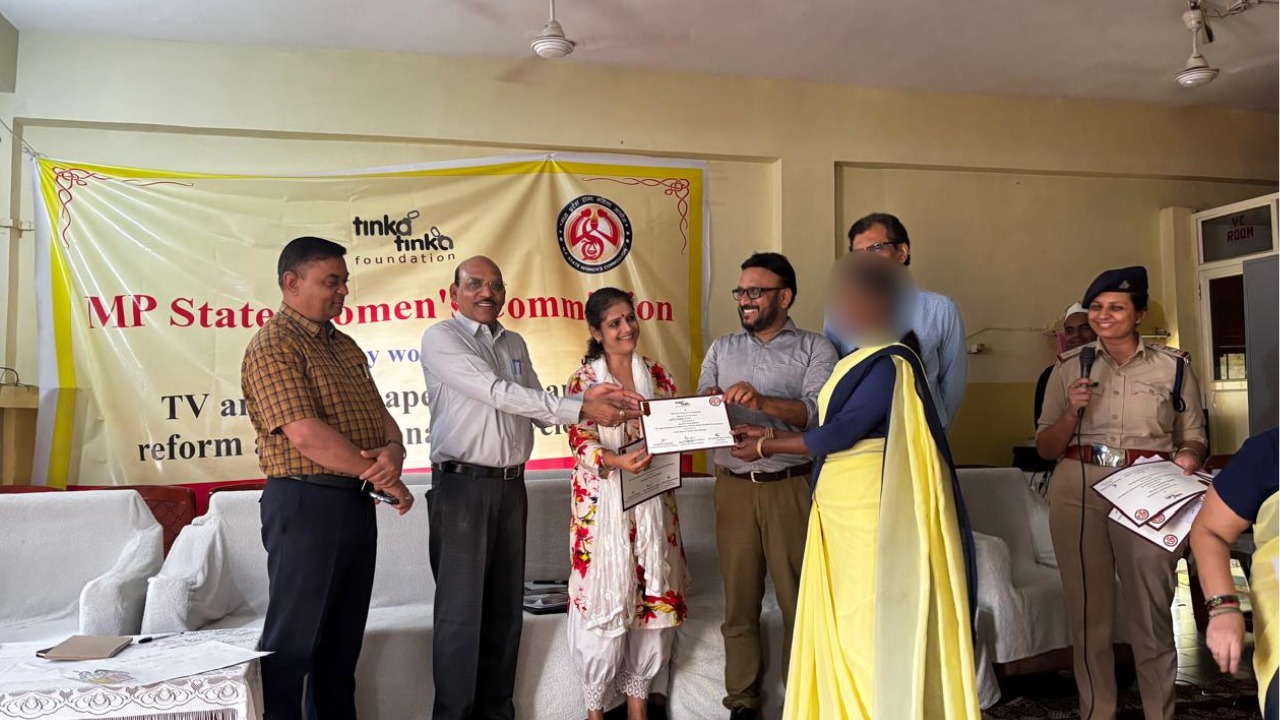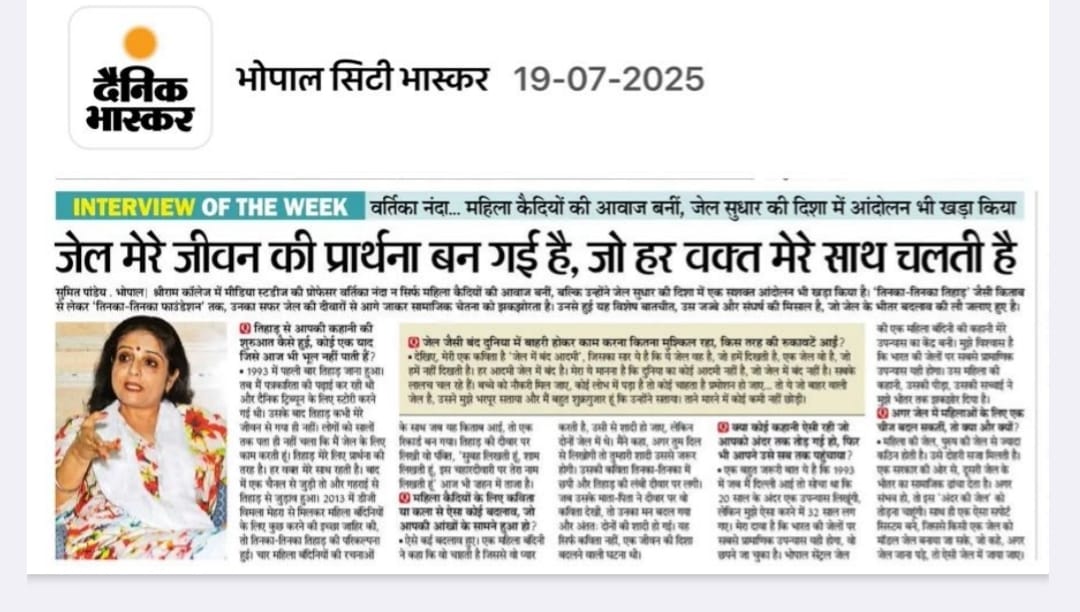17 July, 2025: Voices Unlocked: Healing Through Expression in Bhopal Central Jail
Introduction: On the eve of Nelson Mandela Day on 17 July, 2025, the Madhya Pradesh State Women’s Commission, in collaboration with the Tinka Tinka Foundation, organised a one-day communication and creativity workshop titled “Voices Unlocked: Women Inmates Discover the Power of Communication” at Central Jail, Bhopal. The objective of the initiative was to help women inmates express themselves through art, media, and storytelling, transforming silence into self-awareness and healing. Out of 200 inmates, 115 participated in initial discussions, and 50 were selected for focused training sessions that used TV and newspapers as tools for reform and personality development. The workshop featured stories like Anjani’s, a transgender inmate who rediscovered her dream of becoming a fashion designer, and Rajni’s, a 62-year-old who learned to read and found peace through art. Women expressed their emotions through paintings on themes such as “Dreams in Jail”. According to Member Secretary Suresh Tomar, the Commission plans to expand such skill and communication development programmes across other prisons in Madhya Pradesh. Through this initiative, organisers demonstrated how communication and creativity can serve as powerful tools for rehabilitation and dignity in prisons.
Gratitude: Suresh Tomar, Secretary, MP State Women's Commission, M R Patel, (DIG, Jail), Rakesh Bhangre (Superintendent, Central Jail, Bhopal) and Praveen Gangrade ( Director Anand Department)
“Voices Unlocked: Women Inmates Discover the Power of Communication” in Central Jail, Bhopal
- Learning to Speak: Basics of Communication as Therapy
- A Day of Discovery: From Silence to Self-Awareness
- Madhya Pradesh State Women’s Commission in collaboration with the Tinka Tinka Foundation, celebrate creativity in jail.
Anjani’s Dream Woven in Color and Courage
At 35, Anjani had one dream: to become a fashion designer. She filled out her application forms with hope, but when the institute learned she was from the transgender community, her form was rejected—her identity overshadowing her aspirations. Today, within the walls of Bhopal Central Jail, that dream has found new life.
Here, in a place where society often sees as the end, Anjani has found a beginning. “Outside, we face discrimination but inside these walls, I’ve found the freedom to learn,” she said. The jail, once a symbol of confinement, has become a space of possibility—offering her the education and encouragement she was denied on the outside. Her story is not just about fashion. It’s about dignity, resilience, and the power of second chances. Anjani stood tall among a crowd of women inmates, clutching a painting she had created—a vivid reflection of her dreams. With quiet strength and unwavering resolve, she declared, “I want to be a fashion designer.”
Rajni’s Journey: From Silence to Solace
At 62, Rajni’s story is one of quiet transformation. When she entered Bhopal Central Jail in 2005 as a convict, she was illiterate—unable to read or write, and burdened by the weight of her past but here, in the jail, she discovered something unexpected: peace.
Over the years, Rajni learned to read, to express herself, and most importantly, to find happiness. “Jail gave me something I never had outside—solace,” she said softly, her eyes reflecting years of introspection.
Rajni shared her journey through art. She held up a painting she had created—featuring a Tulsi plant and a glowing moon at its centre. The Tulsi, sacred and healing; the moon, serene and constant. Together, they symbolized her newfound faith and inner calm. Her story is a testament to the power of learning, healing, and spiritual growth—even in the most unlikely places.
Expressions Behind Bars: Stories of Hope from Bhopal Central Jail in Madhya Pradesh
These expressions were made by women prisoners in a special one-day workshop on TV and newspapers as a means of reform and personality development in the women's ward of Central Jail, Bhopal. This was organised by Madhya Pradesh State Women’s Commission in collaboration with the Tinka Tinka Foundation, on the eve of Nelson Mandela Day.
The exercise: Out of 200 women inmates in the jail, 115 were chosen for a discourse, later selecting a group of 50 women for the specialised workshop. The workshop was designed to address the communication needs of women inmates, helping them articulate their inner worlds through visual and verbal storytelling. From dreams to regrets, from aspirations to affirmations, the women used media as a mirror to reflect their evolving selves.
What women inmates expressed and the outcome: Women expressed their mental and emotional state through vibrant paintings on themes like dreams in jail etc, topics that have been dealt by Tinka Tinka Foundation in the past as apart of the annual awards given by them. These artworks became more than just creative exercises—they were windows into their inner worlds, tools for healing, and steps toward reclaiming their identities.
The workshop resulted in transforming the space into a canvas of dreams, resilience, and self-expression. The workshop carefully focused on the communication needs of women prisoners—a critical yet often overlooked aspect of rehabilitation. Through the mediums of TV and newspapers, the initiative aimed to foster personality development and prepare inmates for future employment.
These expressions weren’t just artistic—they were therapeutic. Even the illiterate women inmates came forward to express themselves with confidence. Rami, an inmate said, “ this was the best day in the jail, since I have come here. I am thrilled that I could express myself in such a unique manner.”
What the organisers felt: Member Secretary of the Commission, Suresh Tomar, emphasized the long-term vision behind such efforts. “The Commission has been organizing various programmes for skill development of women prisoners, and these initiatives will continue,” he said. “We will make continuous efforts for the upliftment of women and will soon conduct skill development programmes for women inmates in other jails. ”
Together, these voices—spoken and painted—signal a new chapter in rehabilitation: one where communication becomes a bridge to dignity, growth, and reintegration.
Professor Vartika Nanda, Head, Department of Journalism, Lady Shri Ram College, Delhi University and Founder, Tinka Tinka Foundation said, “ Tinka Tinka Foundation is credited to introduce journalism in jails. This exercise is another step in this direction. We want to impart basic skills in these women, give them the opportunity to fill their empty time with something meaningful, provide them a purpose and address their communication needs. By doing so, we are able to also cater to their mental health. Today’s exercise has once again proved that incarcerated women must be given such platforms so that they are able to live a life of purpose and dignity.”
Jail Superintendent Rakesh Bhangre gave unwavering support to the entire exercise. He said, “ We have seen several organisations visiting us in the past but very few go deeper into the prison life and offer remedies for improving living conditions of inmates. I would say, today’s exercise has been a powerful step in fulfilling this.”
DIG jail M R Patel, Director and Anand Department Praveen Gangrade were also present during the event.
Background: Tinka Tinka Foundation is widely recognised for its seminal work in the form of a unique coffee table book- Tinka Tinka Madhya Pradesh- which was released by Shri Kiren Rijuji, then Minister of State for Home Affairs in 2018. This book stands out as an authentic documentation of prison life, capturing the lived experiences of 19 participants—including 12 male inmates, 2 female inmates, 4 children residing with their mothers in jail, and one prison guard (prahari). Through vivid visuals and personal narratives, the book offers a rare and intimate glimpse into the emotional, social, and psychological dimensions of incarceration. Her "Study of the condition of women inmates and their children in Indian Prisons and their communication needs with special reference to Uttar Pradesh" was been evaluated as OUTSTANDING by ICSSR and was released by Manoj Kumar Singh (IAS), Chief Secretary, Uttar Pradesh in 2024.
......................................................................................................................................................
Press Release in Hindi
सेंट्रल जेल,
भोपाल: सपनों और साहस की चित्रशाला बनी जेल
नेल्सन मंडेला दिवस की पूर्व संध्या पर, भोपाल की सेंट्रल जेल में एक
परिवर्तनकारी पहल सामने आई, जिसे मध्य प्रदेश राज्य
महिला आयोग और तिनका तिनका फाउंडेशन ने मिलकर आयोजित
किया। इस एक दिवसीय विशेष कार्यशाला में 115 महिला बंदियों ने भाग लिया, जिसमें से 50
को मीडिया, संप्रेषण और व्यक्तित्व विकास पर आधारित
विशेष सत्र के लिए चुना गया।
📚 कला, कहानी और आत्म-अभिव्यक्ति का संगम
कार्यशाला का उद्देश्य था – बंदियों की संवादात्मक ज़रूरतों को समझना और
उन्हें अपनी भावनाओं, सपनों और पछतावे को शब्दों और रंगों में पिरोने का
मंच देना। टीवी,
अख़बारों और पेंटिंग्स की सहायता से उन्होंने अपनी
पहचान और आत्म-खोज को अभिव्यक्त किया।
🎨 अंजनी की कहानी:
रंगों में बुना सपना
35 वर्षीया अंजनी,
ट्रांसजेंडर समुदाय की सदस्य हैं। उनकी चित्रकला
में फैशन डिज़ाइनर बनने की आकांक्षा उजागर हुई। उन्होंने कहा, "बाहर हम भेदभाव सहते हैं, लेकिन जेल के भीतर मैंने
सीखने की आज़ादी पाई है।"
🌙 रजनी की यात्रा:
चुप्पी से सुकून तक
62 वर्षीय रजनी 2005
में जेल आईं. उन्होंने ने जेल में रहकर पढ़ना-लिखना
सीखा और जीवन को नया अर्थ दिया। उनकी तुलसी के पौधे और चंद्रमा की चित्रकला उनकी
आस्था और शांति की कहानी कहती है।
🖌️ दीवारों के भीतर नई
पहचान
अशिक्षित महिला बंदियों ने भी आत्म-विश्वास के साथ भाग लिया। बंदी रमी ने कहा, "यह जेल में मेरा सबसे अच्छा दिन था।"
🔗 संस्था की दृष्टि:
सुधार और सम्मान का वादा
राज्य महिला आयोग के सदस्य सचिव सुरेश तोमर ने कहा कि यह प्रयास अन्य जेलों तक
बढ़ाया जाएगा। जेल अधीक्षक राकेश भंगरे ने इस पहल की सराहना की, इसे सुधार की दिशा में ठोस कदम बताया।
🖊️ तिनका तिनका
फाउंडेशन: जेल में पत्रकारिता का प्रवेश द्वार
तिनका तिनका की संस्थापक और लेडी श्रीराम कॉलेज की पत्रकारिता
विभागाध्यक्ष प्रोफेसर वर्तिका नंदा ने कहा, "हम खाली समय को
उद्देश्यपूर्ण बनाकर मानसिक स्वास्थ्य का समर्थन करते हैं। हम जेलों में अनूठे
प्रयोग कर बंदियों की जिंदगी में बेहतरी लाने और उन्हें समाज में बेहतर इंसान के
तौर पर लौटने में मदद कर कर रहे हैं."
📚 मध्य प्रदेश की
जेलों पर महत्वपूर्ण दस्तावेज
तिनका तिनका फाउंडेशन ने 2018 में जेलों पर एक कॉफी टेबल बुक- तिनका तिनका
मध्य प्रदेश का प्रकाशन किया था जिसके केंद्र में मद्य प्रदेश की जेलें थीं। ICSSR ने 2020 में प्रों. नन्दा के उस शोध को उत्कृष्ट करार किया था जिसमें जेल के
बंदियों की संवाद की जरूरतों पर जोर दिया गया था।
🌱 नवाचार की ओर एक कदम
DIG जेल एम.आर. पटेल और आनंद विभाग के निदेशक प्रवीण गंगराड़े भी इस कार्यक्रम में
शामिल रहे।
.........
In Press: 18 July, 2025: https://www.freepressjournal.in/bhopal/life-of-woman-is-more-difficult-in-family-than-jail-say-female-prisoners
DAINIK BHASKAR: 18 JULY
DAINIK BHASKAR: 19 JULY






.jpeg)


1 comment:
Knowledge is your strongest shield! 🛡️⚖️ Always be aware of your legal rights—whether dealing with law enforcement, workplace issues, or personal disputes. A single informed decision can save you from injustice. Stay empowered, stay protected! #KnowYourRights #LegalAwareness #SelfDefense
Post a Comment